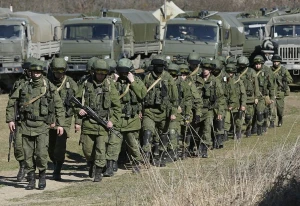
Kursk attack could end ban on Ukraine’s use of long-range missiles deep inside Russia
Ukrainian National Guard (NGU) Reserve Major Oleksii Hetman believes that the operation in the Kursk region will encourage partners to lift the ban on Ukraine's long-range weapons strikes on military targets in Russia
He shared this opinion on Espreso TV.
Hetman also discussed the achievements already made thanks to the operation in the Kursk region.
"One of the objectives of this operation is to force Russia to use either poorly prepared troops or those who are not fully equipped. Russia is withdrawing troops not only from the frontlines but also from reserves within the country. Reports suggest that troops originally intended for the Pokrovsk direction, where intense fighting is happening, might instead be redirected to the Kursk direction. Additionally, troops are being pulled from the Kharkiv region and Crimea, loaded onto transport platforms, and redeployed. This shift already shows the impact of our operation. We also expected Russia to launch offensives in the Sumy region, similar to their previous attempts to attack Kharkiv and come within range of artillery, but their plans failed," Hetman explained.
He believes that this operation by the Ukrainian Armed Forces will be a compelling argument for Western partners to lift the restrictions on long-range weapons for Ukraine.
"I am confident that our operation in the Kursk region will serve as a strong argument for our partners to lift the restrictions on long-range weapons. To the average German or American, it might seem unusual that we are conducting offensive actions on Russian territory. Yet we are unable to use American or German missiles against military targets due to somebody’s ‘fears of escalation.’ Those who say that will look ridiculous. I believe neither Chancellor Scholz nor President Biden wants to appear ridiculous, so I am hopeful that this will lead to a resolution regarding the Taurus missiles," he said.
Hetman also noted that this operation is shifting how our partners view Ukraine.
"Our partners' attitude toward Ukraine changes when we are not just holding the line but actively winning and pressuring the enemy. This shift in perception increases their willingness to support us. I believe this will result in more military aid. People are realizing that Russia is not as formidable as they thought and that Putin is weak. This realization could lead to tougher sanctions and a shift in how political leaders in Europe, America, and globally view the Russian Federation," Major Oleksii Hetman said.
Ukraine’s cross-border incursion in Russia’s Kursk region
On August 6, the authorities of Russia's Kursk region stated that the Ukrainian Armed Forces allegedly tried to break through the Russian border, but were allegedly pushed back. Later, the Russian Defense Ministry reported that "the Ukrainian sabotage and reconnaissance group retreated to its territory.”
On August 7, Kremlin leader Vladimir Putin convened the Russian military leadership to discuss the situation in the Kursk region, which he called a "large-scale provocation." At the time, Russian Foreign Ministry spokeswoman Maria Zakharova called on the international community to "strongly condemn the Kyiv regime's criminal attacks on Russian territory."
Additionally, in the Kursk region, the Russians have started forming UAV operator units from civilians, providing them with up to 10 hours of training.
On August 7, a state of emergency was introduced in the Kursk region.
On August 8, the Institute for War Studies reported that Ukrainian troops confirmed advancing up to 10 km deep into the Kursk region as mechanized offensives continued.
The Washington Post reported that Ukraine has taken control of the gas metering station in Sudzha, Kursk region. Previously, Russia claimed that the Ukrainian Armed Forces had occupied several border villages and part of the town of Sudzha.
Deputy Pentagon Press Secretary Sabrina Singh stated that Ukraine’s actions in the Kursk region in Russia "are consistent with U.S. policy" and do not cause any escalation.
On Friday, August 9, it was reported that terrorists from PMC Wagner intend to fight for Russia in the Kursk region.
The Wall Street Journal, citing its own sources, reported that Russian military leaders have decided to withdraw some of their occupation forces from Ukraine to redeploy them to the Kursk region in response to Ukraine’s military operations.
On August 13, Ukraine's President Volodymyr Zelenskyy stated that the advance of Ukraine’s Defense Forces in Russia’s Kursk region continues, with 74 settlements currently under Ukrainian control.
On August 13, John Kirby, Strategic Communications Coordinator at the White House National Security Council, suggested that if Kremlin leader Vladimir Putin is concerned about the developments in the Kursk region, he could choose to end the war.
Since the start of August 14, the Defense Forces have captured over 100 Russian soldiers.
- News















































